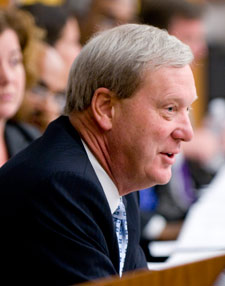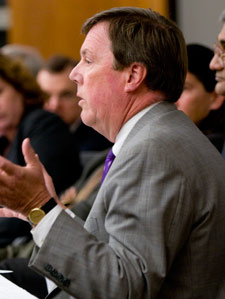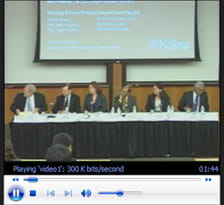Northern Trust chairman William Osborn ’73 joins panel discussion on financial crisis
10/11/2008 - Worse than bad. Unprecedented.
That’s how William Osborn ’73 described the U.S. credit crisis during an Oct. 3 panel discussion at the Kellogg School’s James L. Allen Center.
If anyone in the capacity audience harbored any doubts about the severity of the current financial troubles, Osborn, chairman of Northern Trust Corp., did his best to disabuse them.
“There is a major-league tightening in terms of liquidity going on,” Osborn said in his remarks. “This is a very, very troubling situation today in the financial markets.”
 |
| Northern Trust Chairman William Osborn ‘73 provided a sobering look at the current banking landscape during an Oct. 3 Kellogg School panel discussion. |
| Photo © Nathan Mandell |
 |
| During an Oct. 3 Kellogg School discussion, panelist Bon French ‘76, CEO of private equity firm Adams Street Partners, offered an assessment of recent financial news from his industry’s perspective. |
| Photo © Nathan Mandell |
| RELATED VIDEO |
 |
Kellogg School Experts on U.S. Bailout: Will it work?
Video is password protected for the Kellogg community. Enter Kellogg\netid and password when prompted. |
Driving the point home, the Kellogg School graduate noted that he had never before seen a crisis of this magnitude in his 40 years as a banking professional. He spoke just before Congress voted in favor of a $700 billion rescue package for the U.S. financial system.
Other members of the seven-person panel, which included five Kellogg finance professors and Bon French ’76, CEO of Adams Street Partners, provided details to support Osborn’s concerns. In particular,
Robert McDonald, the Erwin P. Nemmers Professor of Finance, offered several bleak technical snapshots to underscore the point that the U.S. financial markets have gone from bad to worse over the last three weeks. Aggregating data from the Federal Reserve, McDonald showed how the maturity of commercial paper issuance has shortened dramatically, with “almost no activity in the 80-days-or-more range.”
Looking at consumer markets,
Jan Eberly, the John L. and Helen Kellogg Professor of Finance, said circumstances were equally troubling, with 90 percent of loan officers reporting that they have been tightening credit, especially in the sub-prime segment. What began in 2006 as a tightening in the mortgage industry, then spread to all consumer loans in 2007, said Eberly. Now, business lending is also being squeezed.
Eberly indicated the scope of the problem with statistics that included recent plummeting automobile sales — automakers reported a September decline of 27 percent, on top of already flagging performance — and flat consumer growth. The figures are unsettling, she indicated, since an estimated 70 percent of U.S. GDP comes from consumption.
For the private equity market, the circumstances were somewhat less onerous than in the banking industry, said French. This, he said, had to do with fundamental differences in investment strategy between the two sectors. Unlike an investment bank, a firm like Adams Street Partners is not heavily levered, French said, adding that he and his colleagues had made consistent plays relatively independent of market turmoil, rather than overreacting in one way or another, depending on the financial news.
The potential silver lining in the federal rescue plan, French said, was that now “everyone’s going to look in the mirror to realistically assess risk,” something that had not occurred in recent years as investors and institutions demanded, and chased, higher returns.
Other panelists at the event, co-sponsored by the Kellogg Office of the Dean and the Finance Department, included
Arvind Krishnamurthy, the Harold Stuart Professor of Finance;
Deborah Lucas, the Donald C. Clark/Household International Professor in Consumer Finance Fund; and
Ravi Jagannathan, the Chicago Mercantile Exchange/John F. Sandner Professor of Finance.
While none of the panelists would guarantee that the bailout would be enough to fix the U.S. economy, most indicated that dire circumstances required the move, although some questioned whether the rescue would resolve certain deeper economic problems at the root of the current crisis.
Read more about this topic in the faculty blogs
Everything Finance and
Finance and the Public Interest





